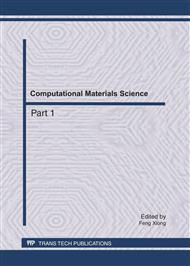[1]
Y. Zhao and G. Karypis: Empirical and theoretical comparisons of selected criterion functions for document clustering. Machine Learning, vol 55(, 2004), pp.311-331.
DOI: 10.1023/b:mach.0000027785.44527.d6
Google Scholar
[2]
M. R. AnderbergIn, Cluster Analysis for Applications. Academic Press, New York, US. (1973).
Google Scholar
[3]
Y. Kao, E. Zahara and I. Kao: A hybridized approach to data clustering, Expert Systems with Applications, vol. 34(2008), pp.1754-1762.
DOI: 10.1016/j.eswa.2007.01.028
Google Scholar
[4]
S, Paterlini and T. Krink: Differential evolution and particle swarm optimization in partitional clustering. Computational Statistics and Data Analysis, vol. 50(2006), pp.1220-1247.
DOI: 10.1016/j.csda.2004.12.004
Google Scholar
[5]
M. Omran, A. Salman and A. P. Engelbrecht: Image Classification using Particle Swarm Optimization. Proceedings of the 4th Asia-Pacific Conference on Simulated Evolution and Learning, Singapore. vol. 1(2002), pp.370-374.
DOI: 10.1142/9789812561794_0019
Google Scholar
[6]
D. M. Van and A. P. Engelbrecht, Data clustering using particle swarm optimization, Pro. of the 2003 IEEE Congress on Evolutionary Computation, pp.215-220, Piscataway, NJ(2003).
DOI: 10.1109/cec.2003.1299577
Google Scholar
[7]
X. Cui and T. E. Potok, Document clustering analysis based on hybrid PSO+K-means algorithm, Journal of Computer Sciences, vol5(2005), pp.27-33.
Google Scholar
[8]
J. Liu, L. Han and L. Hou, Cluster Analysis Based on Particle Swarm Optimization Algorithm. Systems Engineering-Theory & Practice, vol. 25(2005), pp.54-58.
Google Scholar
[9]
R. A. Krohling, F. Hoffmann and L. dos Santos Coelho Co-evolutionary particle swarm optimization for min-max problems using Gaussian distribution, IEEE Proc. Congress of Evolutionary Computation, Portland, Oregon, Vol. 1(2004), pp.959-964.
DOI: 10.1109/cec.2004.1330965
Google Scholar
[10]
J. Kennedy, Bare bones particle swarms, in Proc. IEEE Swarm Intell. Symp. Indianapolis, IN, (2003), pp.80-87.
Google Scholar
[11]
N. Higashi and H. Iba, Particle swarm optimization with Gaussian mutation, in Proc, IEEE Swarm Intelligence Symp., Indianapolis, pp.72-79(2003).
DOI: 10.1109/sis.2003.1202250
Google Scholar
[12]
G. D. Magoulas and A. D. Anastasiadis Approaches to Adaptive Stochastic Search Based on the Nonextensive q-Distribution, International Journal of Bifurcation and Chaos. Vol. 16(2006), no. 7, p.2081-(2091).
DOI: 10.1142/s0218127406015921
Google Scholar
[13]
J Kennedy and Eberhart R, Particle Swarm Optimization, Proceedings of IEEE International Conference on Neural Networks (ICNN), Perth, p: 1942-1948(1995).
DOI: 10.1109/icnn.1995.488968
Google Scholar
[14]
C. Maurice and J. Kennedy, the Particle Swarm-Explosion, Stability, and Convergence in a Multidimensional Complex Space. Transactions on Evolutionary Computation, pp.58-73(2002).
DOI: 10.1109/4235.985692
Google Scholar
[15]
D. N. Jeyakumarb, T. Jayabarathia and T. Raghunathana, Particle swarm optimization for various types of economic dispatch problems, International Journal of Electrical Power & Energy Systems, vol. 28, pp.36-42(2006).
DOI: 10.1016/j.ijepes.2005.09.004
Google Scholar


